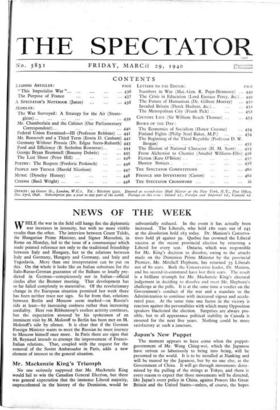NEWS OF THE WEEK
WHILE the war in the field still hangs fire the diplomatic war increases in intensity, but with no more visible results than the other. The interview between Count Teleki, the Hungarian Prime Minister, and Signor Mussolini, in Rome on Monday, led to the issue of a communique which made pointed reference not only to the traditional friendship between Italy and Hungary, but to the relations between Italy and Germany, Hungary and Germany, and Italy and Yugoslavia. More than one interpretation can be put on this. On thif whole it looks like an Italian substitute for the halo-Russo-German guarantee of the Balkans so loudly pre- dicted in German—conspicuously not in Italian—official circles after the Brenner meeting. That development has so far failed completely to materialise. Of the revolutionary change in the European situation promised last week there has been neither trace nor sign. So far from that, relations between Berlin and Moscow seem marked—on Russia's side at least—by increasing coolness rather than increasing cordiality. Herr von Ribbentrop's restless activity continues, but the expectation aroused by his spokesmen of an imminent visit by M. Molotoff to Berlin has been met on M. Molotoff's side by silence. It is clear that if the German Foreign Minister wants to meet the Russian he must journey to Moscow himself once more. In Paris there are signs that M. Reynaud intends to attempt the improvement of Franco- Italian relations.. That, coupled with the request for the removal of the Soviet Ambassador in Paris, adds a new element of interest to the general situation.


































